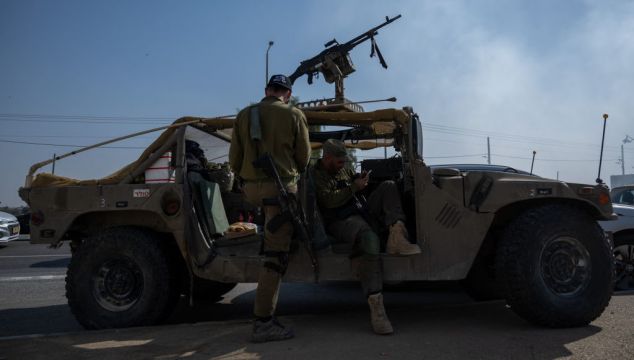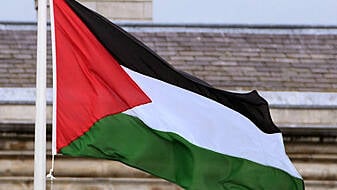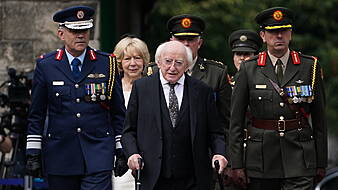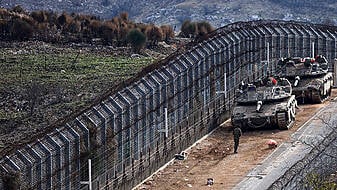Israel is preparing a ground invasion of Gaza, Prime Minister Benjamin Netanyahu said on Wednesday while Israeli shelling killed more Palestinian civilians and international pressure grew to deliver aid and to safeguard hostages held by Hamas.
U.S. President Joe Biden, in remarks looking beyond the war that broke out with an October 7th attack on Israel by Palestinian Hamas militants, said the future should include a two-state solution for Israel and the Palestinians.
Israel should be integrated among its Arab neighbours, he said.
"Israelis and Palestinians equally deserve to live side by side in safety, dignity and in peace," Biden said at a joint press conference in Washington with visiting Australian Prime Minister Anthony Albanese.
Biden said he believed one reason Hamas militants attacked southern Israel, killing 1,400 people and taking more than 200 hostages of different nationalities, was to prevent normalising relations between Israel and Saudi Arabia.
Israeli retaliatory strikes have killed over 6,500 people, the health ministry in the Hamas-run strip said on Wednesday. Reuters has been unable to independently verify the casualty figures of either side.
Biden said he had no notion that the Palestinians were telling the truth about how many had been killed. "I'm sure innocents have been killed, and it's the price of waging a war."
In Jerusalem, Netanyahu said the decision on when forces would go into Gaza would be taken by the government's special war cabinet, but he declined to provide any details on the timing or other information about the operation.
"We have already killed thousands of terrorists and this is only the beginning," Netanyahu said in a televised statement.
"Simultaneously, we are preparing for a ground invasion. I will not elaborate on when, how or how many. I will also not elaborate on the various calculations we are making, which the public is mostly unaware of and that is how things should be."
Israeli tanks and troops are massed on the border with Gaza awaiting orders. Israel has called up some 360,000 reservists.
International pressure is growing to delay any invasion of Gaza, not least because of hostages. More than half the estimated 220 hostages held by Hamas have foreign passports from 25 different countries, the Israeli government said.
The Wall Street Journal, citing U.S. and Israeli officials, reported that Israel had agreed to delay invading Gaza for now so that the United States could rush missile defences to the region to protect U.S. forces there, reflecting its concern about the Gaza war spreading around the Middle East.
U.S. officials have so far persuaded Israel to hold off until U.S. air defence systems can be placed in the region, as early as this week, the Journal said.
Asked about the report, U.S. officials told Reuters that Washington has raised its concerns with Israel that Iran and Iranian-backed Islamist groups could escalate the conflict by attacking U.S. troops in the Middle East. An Israeli incursion into Gaza could be a trigger for Iranian proxies, they said.
As Israel stepped up bombings of south Gaza, violence flared elsewhere in the Middle East and a showdown loomed at the United Nations over aid to Palestinian civilians, hundreds of thousands of whom fled from north to south in the tiny coastal strip.
Israel had warned them it would bombard mainly the north to wipe out Hamas militants.
Among Wednesday's casualties, an internally displaced person was killed and 44 were injured in an air strike near an United Nations Relief and Works Agency (UNRWA) school in the southern town of Rafah, said the agency, which is responsible for Palestinian refugees in the strip.
The school was sheltering 4,600 people and sustained severe collateral damage, an UNRWA statement said.
The Israeli-Hamas war has already kindled increased conflict well beyond Gaza.
Israeli warplanes struck Syrian army infrastructure in response to rockets fired from Syria, an ally of Iran.
Syrian state media said Israel had killed eight soldiers and wounded seven near the southwestern city of Deraa, and hit Aleppo airport in the northwest, already out of action.
Israel did not accuse the Syrian army of launching rockets but is suspicious of Iran, its arch-enemy which has a significant military and security presence in Syria.
Iran has sought regional ascendancy for decades and backs armed groups in Syria, Lebanon and elsewhere as well as Hamas. It has demanded Israel stop its onslaught on Gaza.
Israel said its forces also hit five squads in south Lebanon preparing attacks. Lebanon's Iranian-backed Hezbollah group said 42 of its fighters had been killed since border clashes with Israel resumed after the Gaza war erupted.
The United States and Russia were leading rival calls at the United Nations for a pause in fighting to allow aid into Gaza, where living conditions are harrowing with medical care crippled due to a lack of electricity, and food and clean water scarce.
Limited deliveries of food, medicine and water from Egypt restarted on Saturday through Rafah, the only crossing not controlled by Israel.
In proposals the U.N. Security Council was expected to consider on Wednesday, the United States was seeking short pauses to allow aid in while Russia advocated a wider ceasefire. Israel has resisted both, arguing that Hamas would only take advantage and create new threats to its civilians







